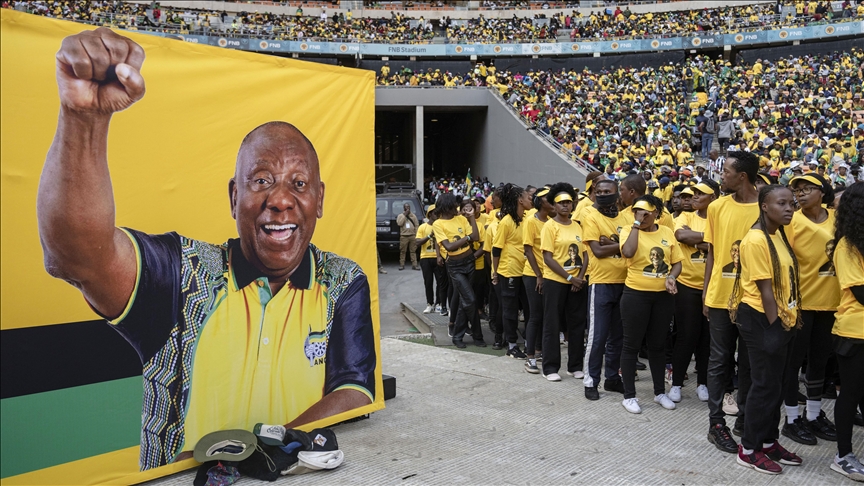South Africa’s president confident his ruling ANC party will win elections
Experts, opinion polls have suggested ANC might not get 51% mark to win elections and form its own government

JOHANNESBURG
South African President Cyril Ramaphosa has expressed confidence that his ruling African National Congress party (ANC) will win the national and provincial elections held on Wednesday.
“I have no doubt whatsoever, in my heart of hearts that the people will once again invest confidence in the ANC to continue to lead the country,” he told reporters after casting his ballot in Chiawelo township near Johannesburg where he grew up.
Ramaphosa said he was happy South Africans had turned out in large numbers to vote for what he called the stabilization and extension of the country’s democracy.
“This is a great day for the people of South Africa – it’s a day when South Africa decides on the future of our country who should lead the government,” he said.
The ANC leader said his party conducted a successful campaign across the country and he believes South Africans will give his party a firm majority.
“We went through the length and breadth of the country to reach out to our people and to also make those who may well have been doubtful about voting to be encouraged to vote,” he said. Crucial elections
South Africans on Wednesday voted to elect national and provincial lawmakers in a contest believed to be the tightest since the first post-apartheid democratic elections of 1994.
Polling stations opened at 7 a.m. local time (0600GMT) and will close at 9 p.m.
There are over 27 million registered voters in the country of some 62 million people.
Experts and opinion polls have suggested that the ANC might not get a 51% mark to win the elections and form its own government without a coalition.
Crowds of people waiting to cast their votes could be seen in parts of Johannesburg as early as 6.30 a.m., despite the cold weather.
South Africans are voting for lawmakers of provincial legislatures and 400 members of parliament, known as the National Assembly. Voting is on a party basis and the parties get seats in the parliament.
These national lawmakers will then elect the president, which means that the party that wins the election gets ultimate power in the country.
There are a record 70 registered political parties contesting in these elections, but all eyes are on the ruling African National Congress party (ANC), the Democratic Alliance (DA), the largest opposition force in parliament, and the Economic Freedom Fighters party (EFF) which is the third largest.
“I want to see change in my country. There is high unemployment, crime and corruption. I hope my vote will bring change,’’ Soweto resident Nkosi Maluleke told Anadolu after casting his vote.
Another voter, who did not give her name, told Anadolu she cast her ballot because it is her democratic right. “During apartheid, we never had the opportunity to vote, now we do and our vote counts,” she said.
The ANC once led by the late global icon Nelson Mandela faces its tough contest in 3 decades.
It is also the first time in the country's history that the former president of the ANC which has ruled South Africa since attaining democracy in 1994 is leading an opposition party to challenge his former group.
Jacob Zuma, 82, a former ANC leader who served for two terms, is backing the Umkonto We sizwe political (MK) party which is seen as a threat to Mandela’s movement.









